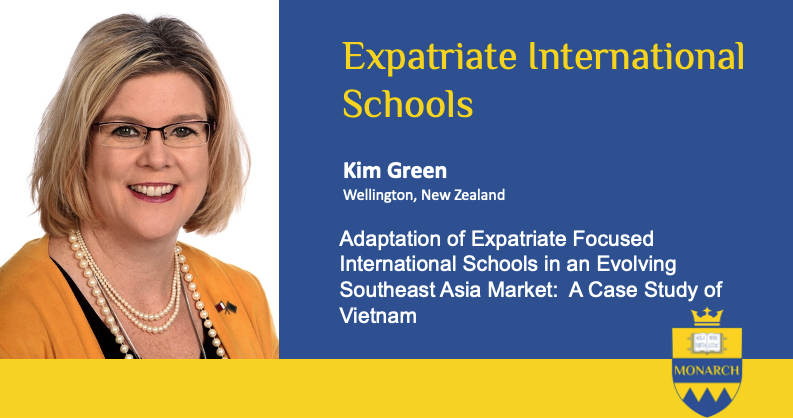Monarch is happy to announce the recently authorised research proposal by PhD/Doctor of Social Science Research Candidate, Ms. Kim Green, addressing the changing role and environment for expatriate focused international schools in Vietnam.
The Research
The surge in private international education provision, driven by globalisation, neoliberalism, and increased mobility, has transformed education into a global trillion-dollar industry, with Asia playing a pivotal role in this growth trajectory (ISC Research, 2023; Le, 2014; Machin, 2017). International schools are transnational spaces that serve as conduits for global mobility and the preparation of individuals for professional futures in transnational organisations (Machin, 2017; Lallo & Resnick, 2008). The burgeoning demand for high-quality education from the transnational capitalist class (TCC) has reshaped educational landscapes, with a notable preference for Western-style international schooling (Gumport, Lannozzi, Shaman, & Zemsky, 1997; ISC Research, 2023; Machin, 2017). As such, private education spending in Southeast Asia has reached nearly $60 billion (ISC Research, 2023).
The rapid expansion of international schools and educational investment in SEA is influenced by governments increasingly prioritising quality education to enhance competitiveness in global markets, evolving economic and social policies, demographic shifts, urbanisation (EY-Parthenon Education, 2016; Gumport et al., 1997; ISC Research, 2023; Le, 2017; Machin, 2017; Mok, 1997; Mok & Welch, 2003; Taylor & Korsmoe, 2023). This growth, facilitated by privatisation and marketisation, leads international school institutions to operate increasingly as economic entities and adopt market-oriented approaches to meet the growing demand of the transnational capitalist class (Le, 2014; Pias, 2023; Tang, 2014). The growth of the TCC poses challenges for expatriate-focused international (EFI) schools in Southeast Asia, necessitating adaptation to changing student demographics, cultural tensions, and stakeholder expectations (Cotterill, 2017; Gumport et al., 1997; ISC Research, 2023; Khanna, 2019; Mok & Welch, 2003; Slaughter & Rhoades, 2009; Sklair, 1997; Steiner-Khamsi, 2004). As Southeast Asian EFI schools confront challenges in adapting to changing student demographics and cultural expectations, there is a pressing need to examine the impacts on organisational systems, structures and behaviours (Clarke & Wildy, 2011; Gautam, Lowery, Mays, & Durant, 2016; Machin, 2017).
The contemplated research examines the impacts of changing student demographics and social and cultural expectations on EFI schools in SEA. A research triangulation method will be employed consisting of: 1. An integrated literature review of the academic domains of Interculturality, Academic Capitalism and Open Systems Theory; 2. A content analysis of professional and quasiacademic literature, and; 3. A qualitative interview process of individual leaders, teachers and parents of EFI schools. A phenomenological research strategy that highlights the lived experiences of the subjects will be employed.
The Researcher
 Ms. Kim Green is a Doctor of Social Science Candidate. She holds a Master’s in Education from Bath University in England. She also holds a Bachelor of Education and Bachelor of Social Science from Waikato University in New Zealand. She has completed a Diploma in Management through ETAS Group Australia as well as a Diploma of Secondary Teaching from the University of Waikato. She is a holder of the New Zealand Teaching Certification from the NZ Teacher’s Council. She has leadership and teaching experience at Qatar Academy Sidra (Qatar); International School Dhaka (Bangladesh); Vientiane International School (Laos); St. John’s College (NZ); Rosehill College (NZ); Tauhara College (NZ) as well as Valley High School (Nevada, USA)
Ms. Kim Green is a Doctor of Social Science Candidate. She holds a Master’s in Education from Bath University in England. She also holds a Bachelor of Education and Bachelor of Social Science from Waikato University in New Zealand. She has completed a Diploma in Management through ETAS Group Australia as well as a Diploma of Secondary Teaching from the University of Waikato. She is a holder of the New Zealand Teaching Certification from the NZ Teacher’s Council. She has leadership and teaching experience at Qatar Academy Sidra (Qatar); International School Dhaka (Bangladesh); Vientiane International School (Laos); St. John’s College (NZ); Rosehill College (NZ); Tauhara College (NZ) as well as Valley High School (Nevada, USA)

